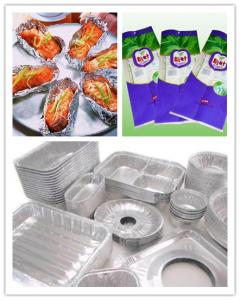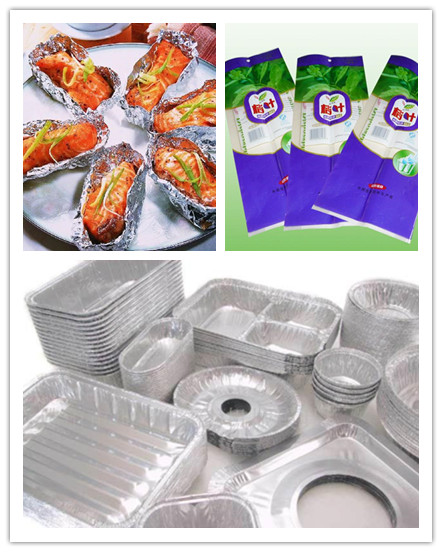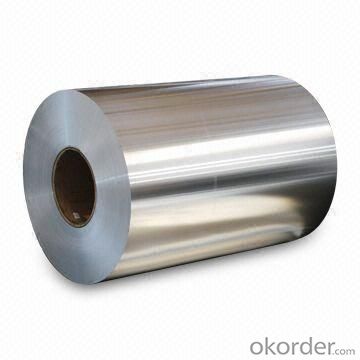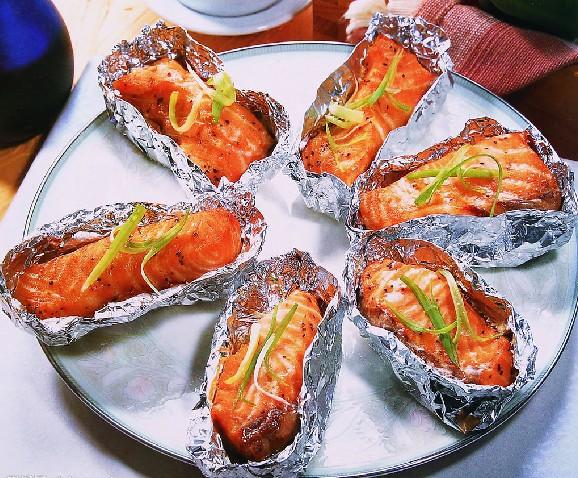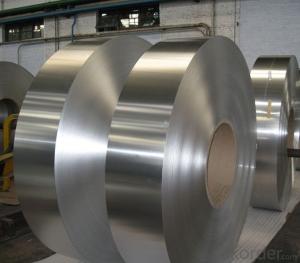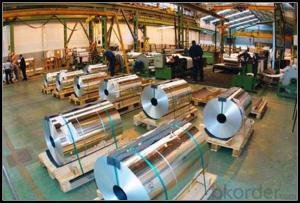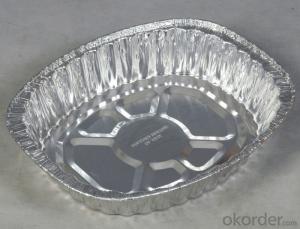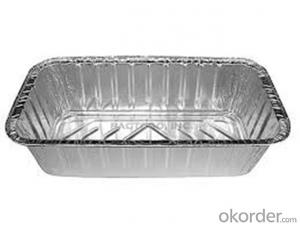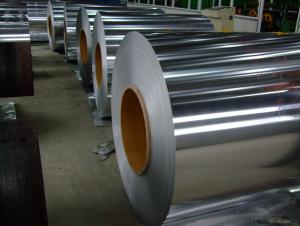2024 Aluminum Coil for Package Dairy Package from China
- Loading Port:
- Shanghai
- Payment Terms:
- TT or LC
- Min Order Qty:
- 5 m.t.
- Supply Capability:
- 9000 m.t./month
OKorder Service Pledge
OKorder Financial Service
You Might Also Like
Aluminium is a relatively soft, durable, lightweight, ductile and malleablemetal with appearance ranging from silvery to dull gray, depending on the surface roughness. It is nonmagnetic and does not easily ignite. A fresh film of aluminium serves as a good reflector (approximately 92%) of visible light and an excellent reflector (as much as 98%) of medium and far infrared radiation. The yield strength of pure aluminium is 7–11 MPa, while aluminium alloys have yield strengths ranging from 200 MPa to 600 MPa. Aluminium has about one-third t,e density and stiffness of steel. It is easily machined, cast, drawn and extruded.
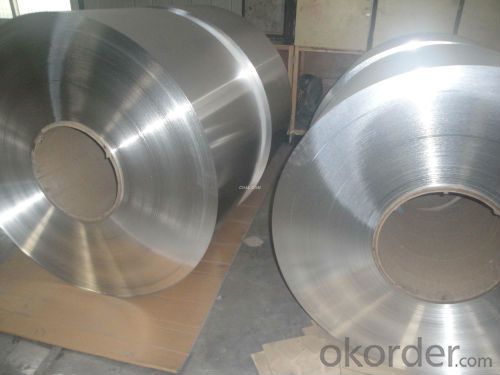
Aluminum Foil
Alloy:1,3,5,8 series
Thickness: 0.006mm—0.20mm
Width: 200mm—1600mm (Can be slitted)
Coating : HSL/Primer
Color : According tocustomers’ requirements

Chemical Compostion :
Alloy | Si | Fe | Cu | Mn | Mg | Cr | Zn | Ti | Other | Al | |
Single | Total | ||||||||||
1050 | 0.25 | 0.4 | 0.05 | 0.05 | 0.05 | _ | 0.05 | 0.03 | 0.03 | _ | 99.5 |
1060 | 0.25 | 0.35 | 0.05 | 0.03 | 0.03 | _ | 0.05 | 0.03 | 0.03 | _ | 99.6 |
1070 | 0.2 | 0.25 | 0.04 | 0.03 | 0.03 | 0.04 | 0.03 | 0.03 | 99.7 | ||
1100 | Si+Fe:0.95 | 0.05~0.40 | 0.05 | _ | _ | 0.1 | _ | 0.05 | 0.15 | 99 | |
1200 | Si+Fe:1.00 | 0.05 | 0.05 | _ | 0.1 | 0.05 | 0.05 | 0.15 | 99 | ||
3003 | 0.6 | 0.7 | 0.05~0.20 | 1.0~1.5 | _ | _ | 0.1 | _ | 0.05 | 0.15 | Remainder |
3004 | 0.3 | 0.7 | 0.25 | 1.0~1.5 | 0.8~1.3 | _ | 0.25 | _ | 0.05 | 0.15 | Remainder |
3005 | 0.6 | 0.7 | 0.3 | 1.0~1.5 | 0.20~0.6 | 0.1 | 0.25 | 0.1 | 0.05 | 0.15 | Remainder |
3105 | 0.6 | 0.7 | 0.3 | 0.30~0.8 | 0.20~0.8 | 0.2 | 0.4 | 0.1 | 0.05 | 0.15 | Remainder |
5005 | 0.3 | 0.7 | 0.2 | 0.2 | 0.50~1.1 | 0.1 | 0.25 | _ | 0.05 | 0.15 | Remainder |
5052 | 0.25 | 0.4 | 0.1 | 0.1 | 2.2~2.8 | 0.15~0.35 | 0.1 | _ | 0.05 | 0.15 | Remainder |
5083 | 0.4 | 0.4 | 0.1 | 0.40~1.0 | 4.0~4.9 | 0.05~0.25 | 0.25 | 0.15 | 0.05 | 0.15 | Remainder |
5086 | 0.4 | 0.5 | 0.1 | 0.20~0.7 | 3.5~4.5 | 0.05~0.25 | 0.25 | 0.15 | 0.05 | 0.15 | Remainder |
6061 | 0.4~0.8 | 0.7 | 0.15~0.40 | 0.15 | 0.80~1.20 | 0.04~0.35 | 0.25 | 0.15 | 0.05 | 0.15 | Remainder |
6063 | 0.2~0.6 | 0.35 | 0.1 | 0.1 | 0.45~0.90 | 0.1 | 0.1 | 0.1 | 0.05 | 0.15 | Remainder |
6082 | 0.7~1.3 | 0.5 | 0.1 | 0.4~1.0 | 0.6~1.2 | 0.25 | 0.2 | 0.1 | 0.05 | 0.15 | Remainder |
8011 | 0.5~0.9 | 0.6~1.0 | 0.1 | 0.2 | 0.05 | 0.05 | 0.1 | 0.08 | 0.05 | 0.15 | Remainder |
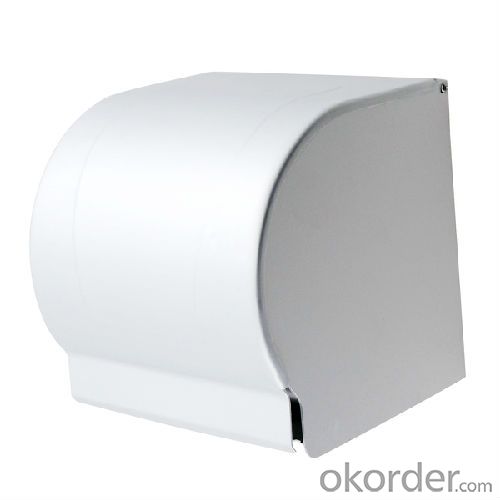
- Q: What are the potential applications of coil-brushed aluminum coils?
- Coil-brushed aluminum coils have a range of potential applications due to their unique properties. They can be used in interior design, architecture, automotive industry, appliances, electronics, and even in the manufacturing of furniture and decorative items. The brushed texture on the surface of the aluminum adds an aesthetic appeal and can be employed for creating modern, sleek, and sophisticated designs. Additionally, the durability and corrosion resistance of aluminum make it suitable for outdoor applications such as signage and cladding.
- Q: What is the shear strength of aluminum coils?
- Various factors, such as alloy composition, temper, thickness, and processing conditions, can cause the shear strength of aluminum coils to vary. When compared to materials like steel or titanium, aluminum alloys generally have lower shear strength. However, the primary considerations for using aluminum coils are their lightweight nature, corrosion resistance, and malleability, rather than their shear strength. To obtain a more precise answer, it is necessary to specify the exact alloy, temper, and dimensions of the aluminum coil in question. These factors greatly impact the shear strength of the material. Additionally, it is important to note that factors like impurities, heat treatment, and the manufacturing process employed can influence shear strength. In conclusion, the shear strength of aluminum coils can differ based on various factors, and it is crucial to consider the specific alloy, temper, and dimensions to determine the exact strength of the material for a given application.
- Q: What is the role of aluminum coils in the transportation industry?
- Due to their numerous advantageous properties, aluminum coils play a crucial role in the transportation industry. One of their primary uses is in manufacturing transportation vehicles, including cars, trucks, trains, and airplanes. Aluminum, being a lightweight material with a significantly lower density than steel, is an ideal choice for enhancing fuel efficiency and reducing weight in transportation systems. The use of aluminum coils in transportation vehicles offers several benefits. Firstly, their lightweight nature helps increase fuel efficiency by reducing the energy required for movement. This results in lower fuel consumption, reduced greenhouse gas emissions, and cost savings for transportation companies. Additionally, aluminum coils possess excellent corrosion resistance properties, enabling transportation vehicles to withstand harsh weather conditions such as rain, snow, and exposure to salt. This durability is particularly important for vehicles operating in coastal or snowy areas. The resistance to corrosion also extends the lifespan of the vehicles, reducing maintenance costs. Furthermore, aluminum coils have a high strength-to-weight ratio, making them a reliable choice for structural components in transportation vehicles. This strength allows manufacturers to design lighter and more efficient vehicles without compromising safety or durability. Moreover, the use of aluminum coils contributes to the sustainability efforts of the transportation industry. Aluminum is highly recyclable, and the recycling process requires significantly less energy compared to its initial production. By utilizing aluminum coils in transportation vehicles, the industry can minimize its environmental impact and reduce reliance on non-renewable resources. In conclusion, aluminum coils play a pivotal role in the transportation industry by enhancing fuel efficiency, providing corrosion resistance, enabling lightweight design, offering structural strength, and promoting sustainability. Their use in manufacturing transportation vehicles leads to cost savings, reduced emissions, improved durability, and enhanced overall efficiency in the transportation sector.
- Q: Are aluminum coils prone to corrosion?
- Yes, aluminum coils are prone to corrosion. Aluminum is a reactive metal that easily forms a protective oxide layer when exposed to oxygen. However, this oxide layer can be compromised by certain environmental factors, such as exposure to moisture, salt, or other corrosive substances. Over time, this can lead to the formation of corrosion on the surface of aluminum coils. Regular maintenance and proper care, such as cleaning and applying protective coatings, can help mitigate the risk of corrosion.
- Q: I bought some drain opener as a source of sodium hydroxide and it has little silvery balls in it which I believe are aluminium. How can I separate the two substances with minimal loss of the sodium hydroxide? I don't care about the aluminium.
- Trust me. Its not worth salvaging the hydroxide. Aluminum hydroxide is unbelievably stable and that means you probably won't be able to salvage the hydroxide without doing electrolysis or something difficult like that. That's like trying to obtain hydroxide from methanol CH3OH. Oh yea you can make methanol quite easily from a halomethane by reacting it with a hydroxide of some kind. But you will not be able to remove that hydroxide at all without neutralizing it with an acid. Hydroxides are bloody awful leaving groups. That oxygen is really glued on to that carbon well. You have to really destabilize that methanol to remove that hydroxide. Same with the aluminum hydroxide. Very stable and strong bond.
- Q: Can aluminum coils be used in refrigeration systems?
- Indeed, refrigeration systems can utilize aluminum coils. The rationale behind selecting aluminum as the preferred material for coil construction in refrigeration systems stems from its remarkable heat transfer capabilities and resistance to corrosion. Not only are aluminum coils lightweight and long-lasting, but they also excel in efficiently transferring heat, rendering them appropriate for a wide range of refrigeration applications, including air conditioning units, refrigerators, and freezers. Moreover, aluminum coils offer the advantage of being easier to mold and install in comparison to alternative materials, thus solidifying their position as the top choice among manufacturers.
- Q: Can aluminum coils be used in the production of cookware?
- Yes, aluminum coils can be used in the production of cookware. Aluminum is a popular material choice for cookware due to its excellent heat conductivity and lightweight nature. By using aluminum coils, manufacturers can easily shape and form the cookware into various shapes and sizes. Additionally, aluminum is resistant to rust and corrosion, making it suitable for long-term use in the kitchen. However, it is important to note that aluminum cookware should have a non-stick coating or be anodized to prevent any potential interaction between the aluminum and food, as excessive consumption of aluminum can be harmful to health.
- Q: What types of aluminum coils are there that are designed for particular applications?
- <p>Yes, there are various types of aluminum coils designed for specific purposes. For instance, there are coils for construction, which are often used for roofing and siding. Coils for automotive applications are used in manufacturing car parts. Reflective coils are ideal for heat reflection in industries like food processing. Coils for electrical applications are used in transformers and wiring. Each type has specific properties like thickness, strength, and surface finish tailored to meet the requirements of their respective industries.</p>
- Q: What are the different width tolerances for aluminum coils?
- The width tolerances of aluminum coils may differ based on specific requirements and industry standards. Typically, the range of tolerances is between +/- 0.005 inches and +/- 0.25 inches. Nevertheless, the intended use of the aluminum coils may necessitate stricter requirements or more lenient tolerances in certain applications. To ascertain the precise width tolerances for a particular application, it is vital to refer to the manufacturer's specifications and guidelines or industry standards.
- Q: What are the different alloy compositions used in aluminum coils?
- There are several different alloy compositions that are commonly used in aluminum coils, each with their own unique properties and applications. Some of the most frequently used alloy compositions include: 1. 1000 series alloys: These alloys are almost pure aluminum (with a minimum aluminum content of 99%), making them highly ductile and corrosion-resistant. They are often used in applications where high formability and good electrical conductivity are required, such as in electrical wiring and packaging. 2. 3000 series alloys: These alloys typically contain small amounts of manganese, making them stronger and more corrosion-resistant than the 1000 series alloys. They are commonly used in applications such as cooking utensils, chemical equipment, and decorative trim. 3. 5000 series alloys: These alloys contain magnesium as the primary alloying element, which significantly enhances their strength and hardness. They are known for their excellent resistance to corrosion and are often used in marine environments, as well as in the automotive and aerospace industries. 4. 6000 series alloys: These alloys are alloyed with magnesium and silicon, which results in improved strength, heat treatability, and weldability. They are commonly used in applications such as architectural and structural components, as well as in transportation and electrical conductors. 5. 7000 series alloys: These alloys are primarily composed of zinc as the main alloying element, which gives them exceptional strength and toughness. They are commonly used in high-stress applications such as aircraft structural components and sporting equipment. It's important to note that there are many other alloy compositions used in aluminum coils, each tailored to specific requirements and applications. The choice of alloy composition depends on factors such as desired strength, corrosion resistance, formability, and cost considerations.
Send your message to us
2024 Aluminum Coil for Package Dairy Package from China
- Loading Port:
- Shanghai
- Payment Terms:
- TT or LC
- Min Order Qty:
- 5 m.t.
- Supply Capability:
- 9000 m.t./month
OKorder Service Pledge
OKorder Financial Service
Similar products
Hot products
Hot Searches
Related keywords
